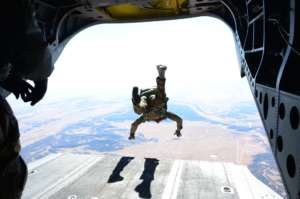
Senate votes to boost civilian oversight of special ops, reinforcing earlier mandate
The Senate's NDAA orders SOCOM to transfer dozens of personnel to the Pentagon office in charge of overseeing it. In the 2017 NDAA, Congress reorganized the chain...
It’s been two years since Congress approved legislation ordering increased civilian oversight over U.S. Special Operations Command. The goal was to strengthen the role of the Pentagon’s assistant secretary for special operations and low intensity conflict, and order DoD to beef up the office’s staff.

Lawmakers are apparently not happy with the progress they’ve seen so far, and continue to believe SOCOM’s explosive growth over the past two decades has far outstripped DoD’s ability to effectively administer it.
Language in this year’s Senate version of the National Defense Authorization Act would order SOCOM to transfer at least 50 of its civilian personnel to the office of the assistant secretary for Special Operations/Low-Intensity Conflict, along with millions of dollars in funding.
“The committee remains concerned that current civilian manpower within the ASD SOLIC is not sufficient to fulfill the ‘service secretary-like’ responsibilities for the advocacy and oversight of special operations forces,” Senators wrote.
In the 2017 NDAA, Congress reorganized the chain of command for special operations. It left operational matters in a chain that runs directly from SOCOM’s commander to the Secretary of Defense.
Meanwhile, the assistant secretary for SOLIC was supposed to begin performing many of the same leadership functions the secretaries of the military services do for the departments of the Army, Navy, and Air Force. These include, for example, administrative oversight over manning and training, and setting acquisition policies particular to special operations.
However, an independent analysis performed by the Army Manpower Analysis Agency and delivered to Congress earlier this year found that the assistant secretary has just 14 full-time staff to handle those “service secretary-like” functions. The agency estimated the office needs at least 64 people to competently carry out those responsibilities.
Indeed, manpower estimates conducted 30 years ago – when SOCOM was first created – pegged the assistant secretary’s required workforce for all of the office’s functions at between 95 and 110 people. The assistant secretary’s office had just 60 personnel as of 2016 while SOCOM has roughly 2,500 people assigned to its Tampa headquarters.
“The assistant secretary and that office has remained weak, compared to its portfolio of responsibilities,” James Locher, who served as the first Senate-confirmed assistant secretary for SOLIC in the early 1990s said in a recent interview with Federal News Radio. “Meanwhile, Special Operations Command went from being seen as a backwater, to now, in the view of many people, being the most important command in the Department of Defense.”
More responsibilities, more oversight
Lawmakers’ rationale for insisting on increased civilian oversight over SOCOM has largely to do with the increased responsibilities the command has taken on in the past decade.
Most recently, DoD gave SOCOM the lead responsibility for countering weapons of mass destruction, a task previously entrusted to U.S. Strategic Command. But SOCOM’s role in many other areas of warfare has gone far beyond what lawmakers first imagined when they created a dedicated command for special operations.
Since 2001, its budget has nearly tripled to $13.6 billion while its personnel have nearly doubled to 70,000. Its overseas deployments have nearly quadrupled.
Locher, who served as a senior Senate Armed Services Committee staffer at the time SOCOM’s enabling legislation — the Nunn-Cohen Amendment — was passed, said Congress always intended the assistant secretary to play a strong oversight role. But the recent legislation should serve to reinforce that intent.
“The reason this was done in the first place is that special operations forces are removed from the operational control of their services when they’re under Special Operations Command, so it was decided that if you’re going to do that, you need someone to play that service secretary-like role,” he said. “The reason the Congress emphasized this is because special operations forces undertake some of the most sensitive activities in the U.S. military around the world, and the develop some of the most sensitive capabilities. It was decided that we needed a civilian overseer, and that was going to be the assistant secretary of Defense.”
Apart from expressing concern about insufficient staffing levels in the assistant secretary’s office, the Senate report said DoD has not gone far enough to implement the organizational changes Congress ordered in 2017.
Latest Defense News
“The committee is concerned that despite passage of [the NDAA] nearly 18 months ago, the implementation of the reforms … remain incomplete,” according to the Senate report. “The deputy secretary of Defense directed the development of recommendations for implementation of these reforms, but no substantive actions have been taken since. Therefore, the committee directs the Secretary of Defense, beginning on July 1, 2018, and continuing on the first day of every month thereafter until full implementation of the ASD SOLIC reforms, to provide the congressional defense committees with monthly progress reports on specific actions taken to institutionalize the ASD SOLIC’s role.”
Read more of the DoD Reporter’s Notebook.
Copyright © 2025 Federal News Network. All rights reserved. This website is not intended for users located within the European Economic Area.
Jared Serbu is deputy editor of Federal News Network and reports on the Defense Department’s contracting, legislative, workforce and IT issues.
Follow @jserbuWFED





